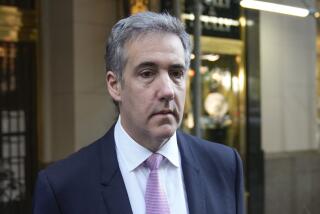Donation Probe Officials Question Clinton and Gore
- Share via
WASHINGTON — FBI agents and Justice Department attorneys questioned President Clinton and Vice President Al Gore this week about telephone calls that they made to potential donors to solicit campaign money in recent years, the White House said Wednesday.
The nation’s two top elected officials were questioned separately in their residences on Tuesday--only three weeks before Atty. Gen. Janet Reno must decide whether to seek an independent counsel to investigate whether Clinton or Gore violated federal laws restricting fund-raising on federal property.
Sources familiar with the sessions said the questioning was conducted “like a regular FBI interview,” which means that neither Clinton nor Gore was under oath. Still, it is a crime under federal law to make false statements to FBI agents.
Attorneys for Clinton and Gore were present and said their clients answered all questions.
“As both the president and vice president have previously announced, they are cooperating fully with this investigation and voluntarily agreed when interviews were requested,” David E. Kendall, Clinton’s attorney, and George T. Frampton Jr., Gore’s lawyer, said in a joint statement.
None of the lawyers involved would specify how long the sessions ran or detail any of the questions. “The subject of the interviews was the telephonic solicitation of contributions in the 1994-1996 time period,” the lawyers’ statement said.
At issue is whether Clinton or Gore violated an 1883 law against soliciting campaign contributions from federal office buildings. There is disagreement among lawyers on whether federal law prohibits either the vice president or the president from soliciting donors by phone from the White House.
Clinton has said he does not remember making any fund-raising phone calls from the White House but that he may have done so. Harold M. Ickes, his former deputy chief of staff, told federal investigators that he was present in October 1994 when Clinton made several solicitation calls from a study in the residential quarters of the White House. Gore has acknowledged making more than 40 phone solicitations from his White House office. He has staunchly defended their legality but also said he would not again make such calls while at work.
Gore’s defenders noted that the 1883 law was intended to prevent federal officials from extorting their subordinates for campaign money. It made no reference to soliciting by way of the telephone, which was invented in 1876 but was not widely used until many years later.
Following usual FBI procedure, the agents who interviewed Clinton and Gore will reduce their notes to summaries. These, in turn, will be weighed by Justice Department attorneys in deciding whether to recommend to Reno that she ask for appointment of an independent counsel.
In a related development, Reno must decide by today whether to order a preliminary inquiry under the independent-counsel law into allegations that campaign contributions influenced Interior Secretary Bruce Babbitt’s rejection of a Native American casino project.
In testimony before a Senate committee last month, Babbitt denied that partisan politics had prompted him to reject such a project in Wisconsin. But testimony to the committee by Paul Eckstein, an old friend and law partner of Babbitt’s, raised the prospect that political considerations were involved in the decision. Eckstein, who had been hired to lobby for the casino, said Babbitt had told him that Ickes, then serving in the White House, had taken an interest in the matter and was pressing the secretary to make a decision on the casino.
Eckstein also testified that he had “no doubt” about his recollection that Babbitt had mentioned political contributions to the Democrats by some Native American tribes.
*
Babbitt said he had never talked to anyone at the White House about the casino but may have briefly invoked Ickes’ name to cut short his meeting with his old friend.
Immediately after the decision against the casino development was announced, a lobbyist hired by tribes opposing the casino rounded up significant contributions to the Democratic Party.
In all, the opposing tribes gave $270,000 to the Democrats, records show.
Reno may close out the inquiry by concluding that no specific or credible evidence was turned up against Babbitt in her office’s initial 30-day review. Or she could move to a full-scale 90-day inquiry, as she did in the Clinton and Gore cases, contending that she could not resolve the issue in 30 days.
Times staff writer David Willman contributed to this story.
More to Read
Get the L.A. Times Politics newsletter
Deeply reported insights into legislation, politics and policy from Sacramento, Washington and beyond. In your inbox twice per week.
You may occasionally receive promotional content from the Los Angeles Times.










